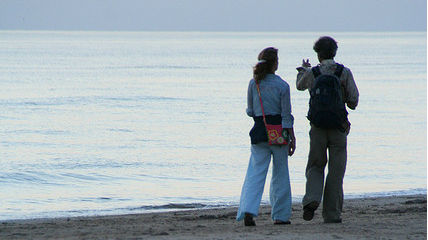Missing the 1970s

If you live long enough everything can happen. Cloning, Honey Boo Boo, a feature movie based on “The Brady Bunch,” Twitter…
“I miss the 1970s,” a friend says at a party.
As I say, if you live long enough, everything can happen.
Her comment inspired choruses of “Muskrat Love” and “Sister Golden Hair” from the overly-festive guests.
We’re clueless about what muskrat love is, but I know what she meant. I miss the 1970s, too.
The 1970s are remembered in caricature for wife-swapping and swinging, but the decade as I remember it, growing up, was sepia-toned and tender. It was the tail of the sexual revolution, the astronomical coma to its more turbulent comet in the 1960s.
The self-conscious sensitivity of the decade makes it easy to mock, although I wonder why that’s so–why efforts at tenderness sit so vulnerable to ridicule on the historical page.
The 1970s were the wellspring for some of the most familiar, middlebrow tropes of modern romance—the sunsets, walks on the beach with two silhouetted figures hand in hand, roses, bubble baths, champagne, and the fascination with soft-focus photography. Its iconic, risqué pop culture offering was Farrah Fawcett in a red swimsuit with perky breasts.
When personals ads in city papers became popular, all prospective suitors claimed that they most loved “sunsets” and “long walks on the beach.” If they were honest, they might have written that they loved Doritos and football. But they were taking the 1970s as their romantic muse.
Remember that 1970s t-shirt, “If you love something, set it free…?” The equivalent t-shirt today would read, “If you love something, stalk it until it slaps a TRO on your ass.”
The affirming 1970s gospel, I’m OK/You’re OK, would be updated in 2013 as “Shoot to the Death at the I’m OK/You’re OK Corral.”
Coming of age in the late 1970s, I had ready access to all kinds of resources. There was Love Story; nice, non-judgmental, antiseptically informative materials in the public school health curriculum that mapped out the basics about birth control and reproduction; and there were the revelations of Our Bodies, Ourselves, a feministauthority on sex that I dog-eared, and that wasn’t just about sex, but about how to live contentedly in our bodies. The book contextualized sexuality in politics and social relations. And there was the blockbuster Joy of Sex, with sketches of various sexual scenarios. It was sort of a Kama Sutra for mildly sophisticated, bourgeois Americans still steeped in Calvinism.
If the 1970s were like a curious, guileless, open-minded 6-year old, then the 1980s were like the wise-cracking, faux sophisticated 14-year old he grew in to.
We were on our way to a fascination with Madonna in a dog collar and bullet bra, and the “porn war” among feminists, as if one’s stance for or against sex generally boiled down to one’s censorship views about low-budget, bad porn.
I think back on Joy of Sex now, and realize that it was trying to do something bravely unique.
Actually, quite radical. The book was trying to show, with its illustrations, “this is what people who are neither sexy Hollywood stars, nor actors who get paid to have sex, look like when they’re having consensual, non-violent, mutually pleasing, erotic encounters with each other.”
And what’s the Ur love story, and sexual vibe, of our time? The most wildly popular, iconic ones are a disorienting chimera of eroticism, cruelty, power-as-dominance, and piety.
There’s Fifty Shades of Gray, and the Twilight series characterized by righteous abstinence and blood-sucking, would-be murderous vampires. It’s a hard, hard world. Meanwhile access to misogynistic and/or violent porn has never been easier or more ubiquitous.
A friend tells me about a freshman at an elite college. He sought a counselor’s help. He’d been trying to have sex with his girlfriend. He tried to do what he’d learned through porn. He couldn’t understand—genuinely—why hair-pulling and other porn moves didn’t appeal. He wasn’t uncaring. He wasn’t doing what he did out of a misogynistic impulse, or at least not an indigenous one. He just didn’t know much about what actual sex with a female who wasn’t playing a role in a porn movie could be like.
If you don’t like those options, you can always opt out of sex with abstinence programs, a makeshift “modesty” movement, and virginity pledges. I’m a big defender of celibacy, and of people who identify as asexual—those who aren’t all that interested in sex, and don’t want to have their lack of interest pathologized so that it can be treated profitably by Big Pharma. A defense of celibacy is part of a pro-sex culture that respects consent unequivocally, and sets a high bar for it. But most abstinence programs work instead on a gross-out, misogynistic factor that once a woman relinquishes her virginity, she has nothing of value left to give. They’re predicated on a loathing of the dirty or “polluted” body of a sexually active, unmarried woman.
The campus hook-up culture of pro forma micro-relationships—a world of mile-wide and inch-deep unions—isn’t that tantalizing for many, either. Just remember: You must not care! You must not get mired in a sexual relationship that would involve deepening intimacy and, with it, attachment, and risk. True, some variation on free love and illusions of “no strings attached” sex was a strain (much criticized) in 1970s culture. But at least it was tied to a self-conscious utopian principle, however naive, that it promoted a social ideal of personal freedom, liberation from marital convention, and a quest for mutual pleasures.
I get the sense that the hook-up culture today is more just the expedient fashion of a larger postmodern culture that borders on collectively sociopathic in its attachment issues.
Where do you go? Mainstream sexual culture isn’t imprinted with a sex-positive, feminist stance. It seems caught between a misogynistic regime of abstinence and a misogynistic regime of hip, undeluded, toughness and in-your-face abrasiveness that passes as outré, emancipatory candor (I pick up my free city paper today, browse its pages, and encounter this putatively cool, abrading, out-there headline: “How to Eat Pussy Like a Porn Star”).
So, yes, I miss the 1970s. I don’t know exactly what “muskrat love” is, but I bet I’d prefer it to 21st-century sexual cruelty.





